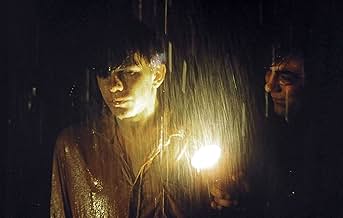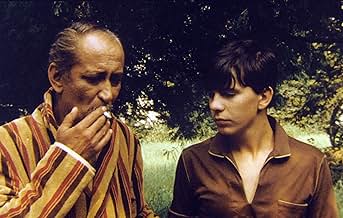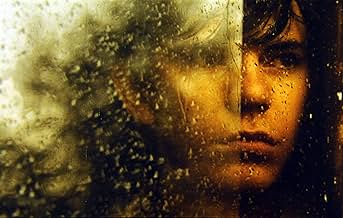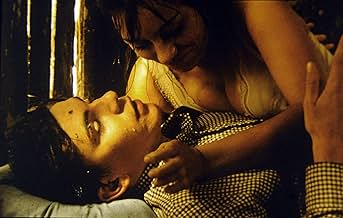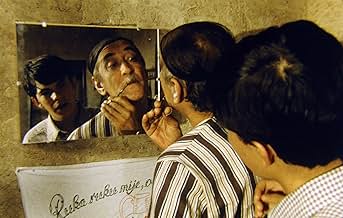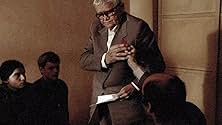AVALIAÇÃO DA IMDb
7,5/10
7,2 mil
SUA AVALIAÇÃO
Adicionar um enredo no seu idiomaA young man's personality is shaped, involving some weird happenings around.A young man's personality is shaped, involving some weird happenings around.A young man's personality is shaped, involving some weird happenings around.
- Direção
- Roteiristas
- Artistas
- Prêmios
- 9 vitórias e 1 indicação no total
Pavle Vuisic
- Tetak
- (as Pavle Vujisic)
Zivko 'Zika' Ristic
- Cica
- (as Zika Ristic)
- Direção
- Roteiristas
- Elenco e equipe completos
- Produção, bilheteria e muito mais no IMDbPro
Avaliações em destaque
whichever corner of the balkans is called home, it is all but unuarguable that Kusturica is the region's greatest filmmaker. i have enjoyed all of his films - most especially "Otac na sluzbenom putu" and "Underground" - but none disturbed me quite like this one disturbed me.
the reason is that he portrays a (former) Yugoslavia i do not know, and have never known. both my parents fled the "acceptable face of communism" during the very years this film shows almost nostalgically. they were roughly the same age as the main character, yet their experience of Tito's paradise was completely and utterly apposite to what Kusturica shows on the screen. the world they knew was one of deprivation and disappearances and harassment and they could not get away from it fast enough.
i am not saying either viewpoint is right or wrong. i just find it eye-openingly disturbing that the same place at the same time can be remembered in such radically different ways.
i believe there is a lesson in that for all of us, especially those of us whose roots lie in the balkans.
the reason is that he portrays a (former) Yugoslavia i do not know, and have never known. both my parents fled the "acceptable face of communism" during the very years this film shows almost nostalgically. they were roughly the same age as the main character, yet their experience of Tito's paradise was completely and utterly apposite to what Kusturica shows on the screen. the world they knew was one of deprivation and disappearances and harassment and they could not get away from it fast enough.
i am not saying either viewpoint is right or wrong. i just find it eye-openingly disturbing that the same place at the same time can be remembered in such radically different ways.
i believe there is a lesson in that for all of us, especially those of us whose roots lie in the balkans.
I've seen this piece very shortly after I've seen Underground(which is my personal no.1). I was prepared for another energy daredevil movie trip into metaphor and symbolism - I was surprised and pleased ... Kusturica has shown ability to produce two absolutely different movies - both superb!
Do you remember Dolly Bell? is funny, sad, romantic, mystic ... and it is real, it is not a movie to go for if you are not in a mood to think and think a lot ... it is a movie about communism and its philosophy as understood by each generation - I've lived those times and I accept: this is not the typical life we lived, but it defines the essence of how we felt and what we did...
Do you remember Dolly Bell? is funny, sad, romantic, mystic ... and it is real, it is not a movie to go for if you are not in a mood to think and think a lot ... it is a movie about communism and its philosophy as understood by each generation - I've lived those times and I accept: this is not the typical life we lived, but it defines the essence of how we felt and what we did...
10doa2001
Excellent. One word to describe the hour and a half of a master-piece.I'm not so sure that non-ex-yugoslav audience would use word master-piece but I think we would all agree that we are talking about excellent , marvelous , memorable (and etc) movie.Well , to be honest , I never expected less from Emir Kusturica as a director teamed with Abdulah Sidran (who is a poet) as a screenplay writer , who gave the movie intelligent and funny dialogues (really a lot of quotes to remember) combined with deep and memorable talking about communism brought to the audience trough the words of main character Dino's father (whose occupation is head waiter in the restaurant). But , before everything `Do you remember , Dolly Bell' is a movie who drags you to the past , to the 60s in the Sarajevo , Yugoslavia , making you wish that you were there then , just to feel the life of the previous generations in the communist system in the time of yugoslav `brotherhood and unity'. Except that it is also the movie about life in the tough neighbourhood full of scoundrels of any kind. After all, Dolly Bell is a victim of the one of them , and Dino tryes to rescue her in the name of love what gives the movie romantic note.One more good thing in the movie is guaranteed the music.It's simply marvelously selected so it really gives the right image of the 60s in Sarajevo (of course you ought to know that in the 70s Sarajevo became capital of ex-yugoslav rock n' roll , so in some way movie represents roots of rock n' roll in Yugoslavia). So , what more to say than watch the movie and you'll remember Dolly Bell for the rest of your life.
Post written by a person nicknamed No Gods, perhaps just proves that this movie may not be for consumption by audiences outside of the Balkans. He/she completely missed the point. There's so much more to this movie, watching it was of great joy and delight for me.
It gives an honest, simple and raw account of Sarajevo realities back in the 1960s, when it was an expanding city in Tito's Yugoslavia. 'Dolly Bell' offers many memorable snapshots that it uses as setting: teenagers mimicking Adriano Celentano, audiences watching 'Rome by night', couples with children dreaming of moving into new housing complexes built by the communist government, lunches with extended family members, community center struggling to buy instruments for their band.....etc, etc. And all this while the main character Dino (played by Kusturica's favourite Slavko Stimac) is finding his way through adolescence.
Basically, the movie is Kusturica's and Sidran's love letter to their respective childhoods, which happened to take place during an interesting time in Yugoslav history not too long after World War II when the country was being rebuilt under new social order and a tangible sense of excitement of participating in something good and worthy was felt amongst certain sections of its population.
Kusturica would of course go on to make much more serious and challenging films later in his career, but this one shows his ability to successfully deal with simple stories that are not driven by big, complex ideas and don't have an instantly dramatic setting.
It gives an honest, simple and raw account of Sarajevo realities back in the 1960s, when it was an expanding city in Tito's Yugoslavia. 'Dolly Bell' offers many memorable snapshots that it uses as setting: teenagers mimicking Adriano Celentano, audiences watching 'Rome by night', couples with children dreaming of moving into new housing complexes built by the communist government, lunches with extended family members, community center struggling to buy instruments for their band.....etc, etc. And all this while the main character Dino (played by Kusturica's favourite Slavko Stimac) is finding his way through adolescence.
Basically, the movie is Kusturica's and Sidran's love letter to their respective childhoods, which happened to take place during an interesting time in Yugoslav history not too long after World War II when the country was being rebuilt under new social order and a tangible sense of excitement of participating in something good and worthy was felt amongst certain sections of its population.
Kusturica would of course go on to make much more serious and challenging films later in his career, but this one shows his ability to successfully deal with simple stories that are not driven by big, complex ideas and don't have an instantly dramatic setting.
Seeing "Dolly Bell" during the recent war in Kosovo forced me to think of the political significance of the film. Almost twenty years after the film was made, Yugoslavia is an extraordinarily different place, albeit one in which traditions die hard. But whether considered in relation to the Yugoslavia of the early 80s or to today's Serbia, what impresses about "Dolly Bell" is its filmmakers' devotion to art and the human condition rather than to a political agenda. It has not become an artifact because it was made to provoke human sympathy, not political reaction. "Dolly Bell" is not a tragicomic masterpiece like "Underground" nor a celebration of optimism and levity in the face of absurdity and injustice as are "When Father Was Away on Business" and "Time of the Gypsies": it is not Kusturica's most clever film, but it is perhaps his most enduring.
Você sabia?
- CuriosidadesWinner Best Actor (Slavko Stimac) at 25th Panama International Film Festival.
- ConexõesFeatured in Maradona by Kusturica (2008)
- Trilhas sonoras24 mila baci
Written by Adriano Celentano, Lucio Fulci, Piero Vivarelli
Performed by Adriano Celentano
[Sung along to by Slavko Stimac]
Principais escolhas
Faça login para avaliar e ver a lista de recomendações personalizadas
- How long is Do You Remember Dolly Bell??Fornecido pela Alexa
Detalhes
Contribua para esta página
Sugerir uma alteração ou adicionar conteúdo ausente


